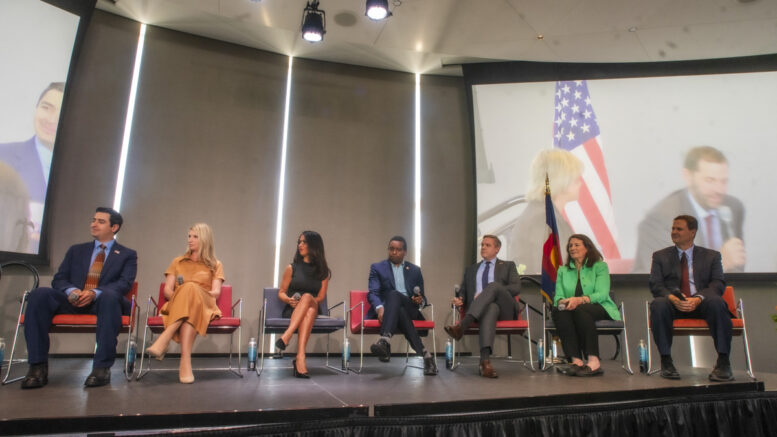Colorado congressional representatives disagreed on the effects of environmental and budget overhauls but agreed that the job of regulating artificial intelligence belongs to the federal rather than state government during a rare full-delegation appearance Tuesday.
Speaking at the Colorado Chamber of Commerce’s congressional luncheon featuring all eight of the state’s U.S. House members, Republican Congressman Jeff Hurd also signaled that he may be open to a limited extension of expiring health-insurance tax credits. And Hurd was one of several panelists who identified specific areas of federal regulation that he believes could be ripe for reform.
The biennial event followed President Donald Trump’s signing of House Resolution 1 — the “One Big Beautiful Bill” that cuts Medicaid and adds business tax breaks, leaving Colorado with a $783 million budget shortfall that led Gov. Jared Polis to call a special session. The four Republicans and four Democrats in the delegation clashed when discussing that topic, with Democratic Rep. Jason Crow calling the bill “devastating” to state residents and GOP Rep. Jeff Crank saying it will force legislators to cut spending that has been “out of control for years.”

U.S. Rep. Jason Crow speaks while U.S. Rep. Gabe Evans looks on Tuesday at a Colorado Chamber of Commerce event
AI shouldn’t be regulated by state, members agree
But it was on another topic that will be a flashpoint of the special session that begins on Aug. 21 that two members found agreement across the aisle — oversight of artificial intelligence. Colorado passed the nation’s most comprehensive AI regulatory bill in 2024, but Polis has asked legislators to ease some restrictions or delay its Feb. 1 effective date to give officials time to study how to protect consumers without pushing the AI sector out of the state.
H.R. 1 originally contained a provision banning states from regulating the AI sector for 10 years to give the federal government time to come up with nationwide rules, but the Senate yanked it from the bill. However, both Democratic U.S. Rep. Brittany Pettersen and Hurd said Tuesday that they’d prefer that Colorado let Congress take the driver’s seat on this topic, even if Pettersen admitted it would be complicated to get something passed.
The Lakewood Democrat said that a state-by-state patchwork of AI rules could be “incredibly problematic” for an emerging national industry and said states don’t have the personnel needed to regulate such a complex subject so intricately. Hurd, from Grand Junction, said, meanwhile, that he has heard from business leaders about how intrusive Colorado’s law is regarding disclosures and appeals of AI-generated decisions, and he vowed to try to get something through Congress.
“I’m concerned that if we have various states implementing AI rules on a piecemeal basis, we are going to impair the economy,” he said, adding that he believes it also is a federal issue because of the national-security risks surrounding artificial intelligence. “Please push us. Hold us accountable to get something done at the federal level.”
Regulatory reform proposals

U.S. Rep. Jeff Hurd speaks while U.S. Rep. Joe Neguse listens at a Colorado Chamber of Commerce event on Tuesday.
On the topic of regulatory reform, the representatives were asked to identify a policy or a federal agency whose rules should come under review. And while some either lauded or criticized Trump for taking a “sledgehammer” approach as opposed to a “scalpel” approach, several also called out specific changes they’d like to see:
- Crow said he’s like reform of Department of Defense contracting policies, which both make it “excruciatingly difficult” to get new technology into field use quickly and make it hard for smaller and upcoming companies to do business with the federal government.
- Republican Rep. Gabe Evans said he’s working with a California Democrat on ways to reform energy permitting and infrastructure permitting as part of the representatives’ roles on the Problem Solvers Caucus.
- Democratic Rep. Joe Neguse noted that his EXPLORE Act that was signed into law in January will simplify the permitting process for outdoor guides and outfitters.
- Hurd said he is working on a bill that would involve two reforms. One would start the time limit on environmental assessments from an applicant’s first contact with a federal agency in order to speed the process, and the other would designate a lead agency on all federal permit applications to ensure the combined work of multiple agencies meets deadlines.
Congressional disagreement on Trump changes
Reforms in H.R. 1 to Medicaid — most notably the addition of work requirements for able-bodied recipients and a new mandate for states to recertify beneficiaries twice annually — drew some of the widest disagreement among delegation members. Democratic Rep. Diana DeGette lamented that forcing hundreds of thousands of Coloradans off Medicaid will flood hospitals, particularly rural institutions, with uninsured and unpaying patients, while Crank argued the work requirements mirror those of welfare benefits and are meant to cut waste and abuse.

U.S. Rep. Brittany Pettersen speaks while U.S. Rep. Lauren Boebert listens at a Colorado Chamber of Commerce event on Tuesday.
Similarly, GOP Rep. Lauren Boebert lauded Trump’s efforts to cut environmental regulations and end subsidies for solar and wind energy, saying they will stop federal energy favoritism and reduce rules that have impoverished natural-resource-rich areas. But Neguse said that tax-credit reductions for clean energy will halt projects that would’ve boosted rural jobs and cut carbon emissions — and that cuts in federal energy-production royalty rates will hurt the budgets of state and local governments that depend on them.
Congressional agreement on tax credits
One area of agreement that surprised some attendees came when Hurd defended the Medicaid changes as being necessary to fix a broken healthcare system but then said he could be open to a temporary extension of enhanced premium tax credits. The credits have limited health-insurance purchasers on individual marketplaces to paying no more than 8.5% of their income for policies; without them, Colorado Insurance Commissioner Michael Conway predicts some buyers will pay two to three times in 2026 what they are paying now.
Hurd said that while elimination of the tax credits is a needed part of overhauling the health system to ensure people don’t require federal subsidies to access it, he would be open to keeping the credits in place in the near term for people facing the biggest cost hikes. But he then would like to see a ramp-down of the credits until they are gone, he added.
“I’d be willing to look at a possible temporary extension,” Hurd said, less than a week after Colorado legislative leaders wrote to delegation members asking for them to consider such a move. “But over time, we need to step down the enhanced premium tax credits and look at delivering healthcare more effectively.”

U.S. Reps. Diana DeGette and Jeff Crank discuss federal policy at a Colorado Chamber of Commerce event on Tuesday.
